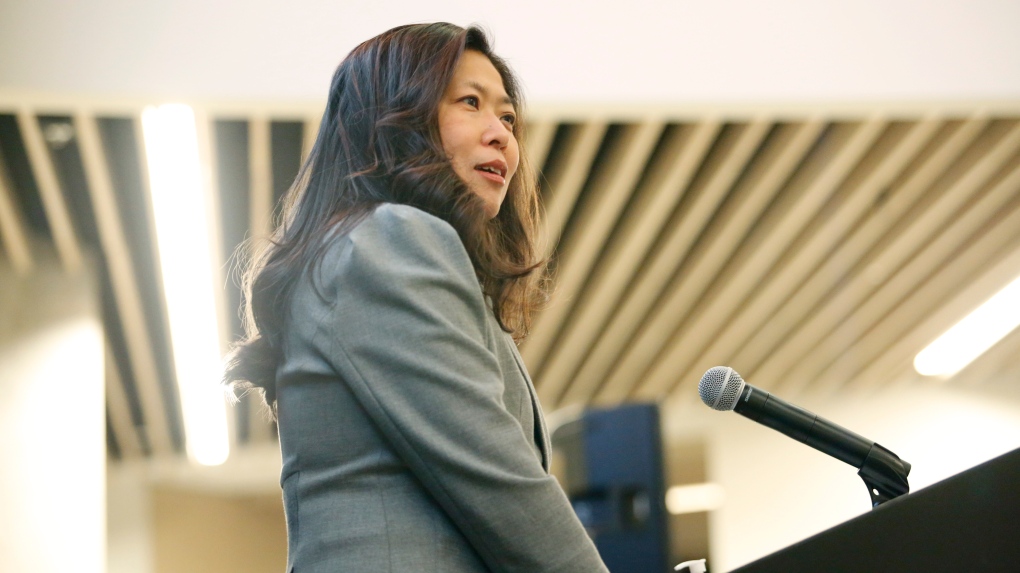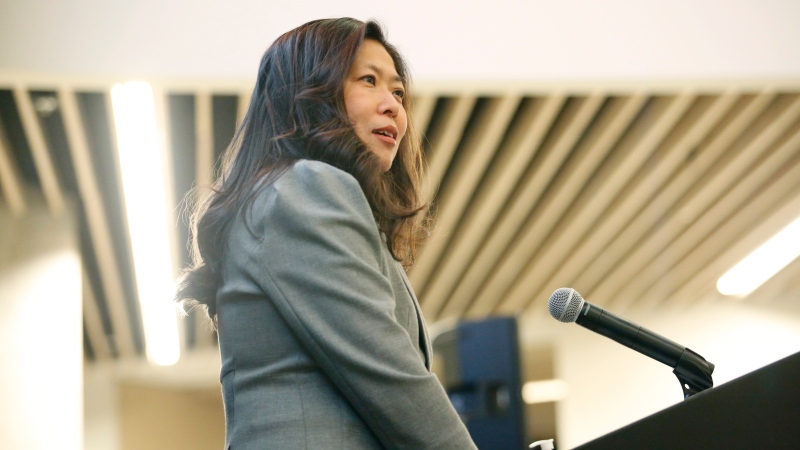

WASHINGTON –
Contrary to stakeholder concerns about justifying American protectionism, International Trade Minister Mary Ng says the blockade earlier this month of Canada’s busiest commercial corridor to the United States helps prove the point she’s constantly making to her U.S. counterparts.
Ng was back in Washington, D.C., on Monday — her third visit in as many months — to reinforce her argument that a healthy and unimpeded trade relationship between the two countries is an essential, linchpin component of their shared economic goals.
The weeklong blockade of the Ambassador Bridge in Windsor, Ont., an offshoot of the trucker-led COVID-19 protests that paralyzed Parliament Hill for much of February, briefly shut down Michigan auto plants and amplified U.S. calls for less dependence on “foreign suppliers.”
But Ng said she heard none of those calls in her meetings over the last two days, including with U.S. Trade Representative Katherine Tai and Sen. Chuck Grassley, an Iowa Republican who sits on the Senate agriculture committee as well as a subcommittee on international trade.
“They didn’t raise it,” she said Monday after a speech and panel discussion with members of the Wilson Center’s Canada Institute.
“What I raised with both of them is the strength of this partnership, and how we can continue to be working more together in both economies. We’re both interested the resiliency of our supply chains, we’re both interested in these trade corridors remaining open (and) we’re both interested in the growth that we have to necessarily work on.”
To drive that home, Ng came armed with statistics to show the two countries exchanged roughly $450 billion in cross-border trade last year — a record level, even in spite of the complications that came with the COVID-19 pandemic.
“This is a testament to the relationship working,” she said. “It’s a testament to our economies relying as much as (they do) on each other. And my job is to make sure that I continue to ensure that confidence in this very important relationship between Canada and the U.S.”
While the protests in Ottawa are over, the blare of their defiant air horns — brazenly trumpeted night after night on U.S. television for weeks by prominent right-wing voices on Fox News, One America News, Newsmax and others — is still echoing south of the border.
A self-styled convoy of truckers, frustrated with government vaccination and mask mandates, spent much of last week traversing the country en route to the U.S. capital, some expecting to arrive in time for President Joe Biden’s state of the union speech Tuesday night.
A larger group of trucks departed a staging area in California last Wednesday and has been documenting its travels on various messaging and social media channels ever since, expecting to arrive in and around D.C. later this week.
The plans are still fluid: one group is expected to stage a protest on the National Mall, the strip of parkland that links Capitol Hill to the Washington Monument, while other organizers say they plan to tie up traffic on the busy interstate known as the D.C. Beltway that encircles the city.
Work crews erected familiar iron fencing and concrete barricades around Capitol Hill over the weekend, a fixture of one of the city’s most recognized landmarks for months in the aftermath of the deadly Jan. 6 riots that disrupted Congress in the final days of Donald Trump’s presidency last year.
Ng refused to say whether she’s received any assurances from U.S. officials that Canada’s auto sector won’t be side-swiped a second time by the threat of President Joe Biden’s proposed tax credits for electric vehicles, a controversial element of his derailed $1.9-trillion package of climate and social policy measures.
The administration is widely expected to resurrect some elements of that legislation before the midterms in November, although it remains unclear whether the tax credits — designed to favour vehicles assembled in the U.S. with union labour — will be back before Congress.
“Canada is going to stand up for its national interests here,” she said. “We’re still working on it.”
Biden recently showcased electric-vehicle manufacturers and suppliers during a White House event designed to promote efforts to establish “end-to-end domestic” supply chains for critical minerals, an essential component in meeting what experts say will be a dramatic spike in demand for EVs.
That event made no mention of a role for trading partners like Canada in helping to procure those precious raw materials, even though deposits are plentiful north of the border and the two countries have a long-standing framework in place for bilateral co-operation.
Ng didn’t seem too concerned.
“I mean, for one thing, Canada has all of those critical minerals that go into the batteries, so I think we actually have something that is important here and important to that supply chain,” she said.
Despite the White House’s public-facing focus on its own domestic priorities, the two countries are indeed teaming up on the issue of critical minerals, she added. “What is it that we’re doing? We’re rolling up our sleeves, we’re doing the work and we’re doing the work together.”
This report by The Canadian Press was first published Feb. 28, 2022.


